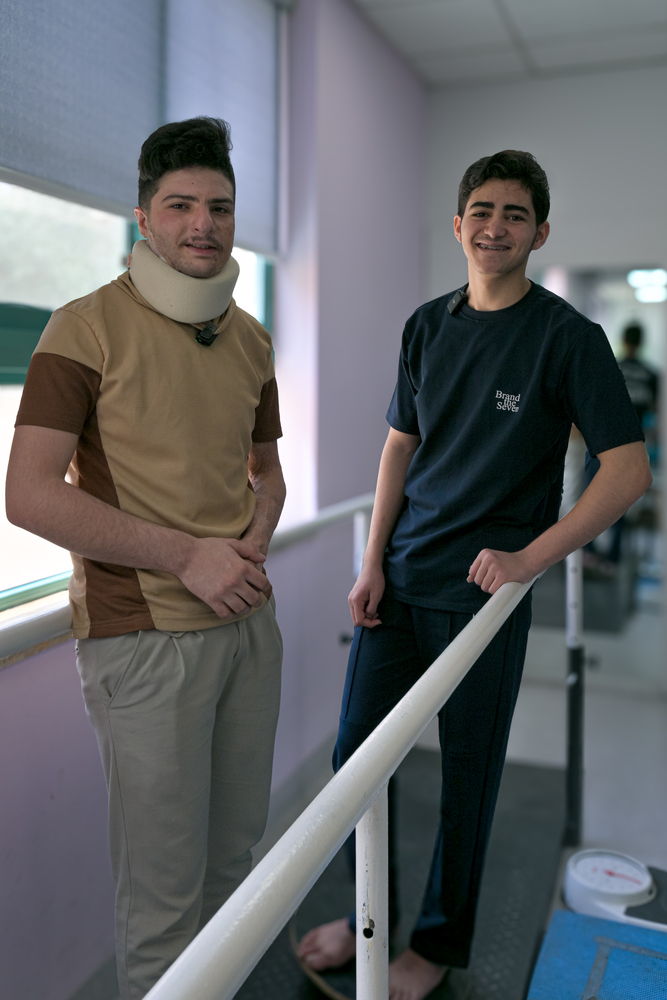The RSP in Amman was established by Médecins Sans Frontières MSF in 2006 to provide surgical, rehabilitative and psychological care for victims of war across the Middle East. As part of psychological care, the RSP encourages peer support – patients offering and receiving support based on shared experiences and challenges. This happens both formally, through group therapy sessions, and informally, through bonds formed between patients.
In the physiotherapy room at MSF’s hospital in Amman, Jordan, Iyad (17, Palestine) is laughing as he is passing a football with his friend Hossam (21, Iraq). It’s part of Iyad’s physiotherapy session.
Iyad and Hossam have become close friends since meeting at the hospital months ago. They spend time outside of their treatment sessions playing football, sharing meals, and challenging each other on the PlayStation. “Last time we played PlayStation, I beat him 6-2,” says Hossam laughing.
Iyad, from Nuseirat refugee camp in Gaza, was critically injured after being shot by Israeli forces in the back of his thigh while he was out looking for food with friends. “There was sudden gunfire. It came out of nowhere,” he says. “My leg got hit. Everyone started running. I was so scared.”
The bullet hit his leg, leading to severe nerve injuries. He lost sensation in his lower leg, foot and ankle. After emergency surgeries at Al-Awda and Al-Aqsa hospitals in Gaza, he was transferred to Egypt for further treatment. Four months later, MSF teams brought him to Amman for specialised reconstructive surgery and physiotherapy. For almost a year, he has been doing physiotherapy sessions every day to regain movement and sensation in his leg. During his treatment, he met Hossam.
Hossam was just nine years old when he was severely injured during an explosion in his hometown Samarra in Iraq. The burn injuries caused by the blast cover his face, neck, abdomen, back and hand. Hossam had 17 surgeries in Iraq before arriving at the RSP in 2019. Since then, he has undergone 10 surgeries, countless physiotherapy sessions and Transparent Neck Orthosis therapy – specialized masks printed by the 3-D printing department – which helps with mobility and the reduction of scarring.
“Life here is nothing like it was when I was still at home,” he says. “It’s different. I’m a foreigner here in Jordan. I’m not surrounded by my people and my family.”
Iyad knows this feeling well. “Back home in Gaza, I was always surrounded by people. Despite the hunger, danger and bombing, I felt safe surrounded by my family and friends. Coming here, I was scared. I worried about what life in the hospital would be like and whether I would have any friends.”
“On top of having these injuries, the feeling of being alone makes it all much more painful. You need someone to talk to. It helps to forget the pain.”
MSF’s mental health teams at the RSP recognise the importance of social support for war victims. Patients at the hospital come from war zones across the Middle East – including Palestine, Iraq and Yemen – to receive medical treatment unavailable in their home countries. Some arrive with caretakers, while others, like Hossam, come alone. Most patients require multiple surgeries and extended rehabilitation, leading to long separations from their families. For many, it is their first time outside of their country.
“People here are of different nationalities and have different injuries,” says Hossam “but there’s no divide between us. We’re brothers and sisters. We understand each other because we know what it feels like. We share the same pain.”
Iyad agrees: “I’ve met Iraqis here who told me how much they support Palestinians. They stand with us. I was surprised by their solidarity. It made me love Iraq.”

When Iyad arrived, he was unable to walk without assistance. Now, he walks independently, but the sensation in his foot and ankle hasn’t returned. He hopes to recover further.
“Before the injury I had big dreams to become a soccer player,” he says. “Now, those dreams are gone. I just hope to recover and regain my health.”
Hossam will need years of treatment to further release the contractures in his skin. In the future, he hopes to not be affected by his injury and to have a family and his own career.
After their treatment, Iyad and Hossam hope to visit each other in their home countries.
“We’re not going to give up on each other,” says Iyad. “It’s hard to let go of good people.”
The Reconstructive Surgery Programme (RSP) in Amman was originally established in 2006 to treat victims of the Iraq War. As conflict-related injuries surged across the Middle East, the hospital in Amman expanded to admit patients from Syria, Yemen, Jordan, Palestine, and is recently starting to admit patients from Somalia and Sudan, offering medical expertise unavailable in their home countries.
The RSP has grown into a regional hub for the treatment of patients with complicated, life-changing injuries, offering surgical and rehabilitative care for orthopedic, plastic and maxillofacial trauma, burns and other conflict-related injuries. Its holistic approach includes surgical care, physiotherapy, occupational therapy, a 3-D printing department, mental health support, and psychosocial care. Most patients stay for months at a time to heal their physical and psychological wounds.
-
Related:
- mental health
- mental healthcare












